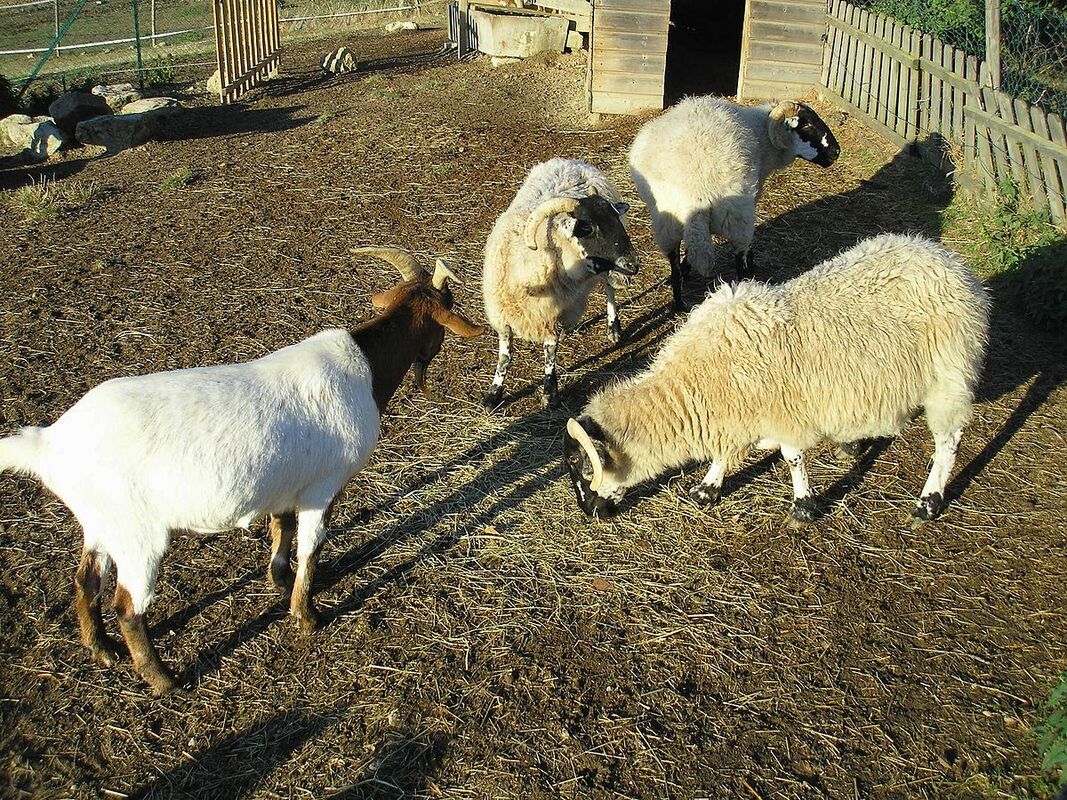 Barry Lewis, CC BY 2.0, via Wikimedia Commons by The Reverend Dr. Warren Crews For the last three Sundays we have been listening to parables from the 25th chapter of Matthew, dealing with the theme of judgment. Three weeks ago, we had the Parable of the Five Wise and Five Foolish Virgins, who responded differently when the bridegroom finally arrived. Last week it was the Parable of the Talents. Three slaves of a very rich man are left with great sums of their master’s money. They were judged on how they handled his money, which differed greatly. In today’s gospel, which you just heard, is the famous Parable of the Great Judgment, better known as the Parable of the Sheep and the Goats. On Judgment Day the judge, who is Christ returned, will separate all the people of all the nations into two groups, just as a shepherd separates his flock into sheep and goats. The criteria for the separation are a set of actions: feeding the hungry, giving the thirsty a drink, welcoming the stranger, clothing the naked, and visiting those in prison. Those who did those things are rewarded with eternal life, and those who didn’t are condemned to the fires of Hell. What struck me about the three parables is that in each one there are winners and losers. In each one there is an issue of faith and of action. The consequences of the lack of faith and the lack of action are disastrous for the losers. Enjoying the presence of the master and his abundance are the rewards for the winners. For me, all three parables seem harsh and unlike the picture we get of Jesus elsewhere in the gospels. All three seem to suggest that there is a list of actions that will be the basis for determining our fate, rather than a picture of Jesus, who is long on grace and unconditional love and short on law with its rewards and punishments. Let’s if we can sort some of this out, make sense of it, and apply it to us. First, I want to suggest that behind these parables is the issue of faith - faith as a trusting relationship with Jesus. The five wise virgins trusted the bridegroom so much that they did not want to risk missing his arrival, so they came prepared with extra oil, and the foolish virgins did not. The two men, who doubled the master’s money, trusted the master’s faith in their abilities. The third man did not. So, in today’s parable, we have those whose trusting relationship with Jesus was close enough that they naturally acted like Jesus by aiding the poor, the sick, prisoners, and so forth—the very actions that they knew Jesus was always doing and which he expected his followers to do also. On the other hand, those whose relationship with Jesus was not close enough for him to have rubbed off on them, so that they would naturally aid those in need. So, it is important to key in on this issue of faith in Jesus and staying close enough to him so that his habits rub off on us. The purpose of these parables is not to erect a list of do’s and don’ts in order to get into heaven. But rather, they want us to realize that the Jesus we encounter in the gospels also wants his followers to imitate him the best we can in how we deal with those who are in great need of help. When we do that it is as though we are meeting Jesus in those people, even though we might not have a mystical sense of meeting Christ. Faith active in love will naturally lead us to reach out to those who need our help. Perhaps, a simple example from an experience I once had would help. I had gone for a medical appointment. The medical building had two ways of entering: a revolving door and an automated door, which had a tall switch you had to push to activate the door. As I was about to go through the revolving door, a woman in a wheelchair came up, and quickly remarked: “There’s no switch.” Sure enough, the switch for the automated door was missing. And, there was no way she could get through the revolving door in her wheelchair. But, the automated door did have a handle on it, so I reached up and slowly pulled the door open. She responded by saying, “I didn’t know that you are a switch!” I smiled and said, “Ah, but I am multi-talented!” We both had a good laugh. Then I held open the elevator door for her, and up we went.
Notice that I said that such actions are part of our Christian formation, which is a life-long process. That brings me to my last point about our parable. I want to put in a good word for goats! Goats tend to be smarter than sheep. Sheep require much more land to graze on than goats do, because goats are much hardier eaters. Sheep flee from danger; goats stand to fight it. Sheep are skittish, goats are calm - so much so that they often are placed in with cattle and horses to keep them calm, much as the presence of dogs has on humans. The one area in which sheep outshine goats is that sheep herd well, whereas goats are more independent. But, for our purposes, it is important to remember that shepherds had both sheep and goats mixed n their flocks, and that they separated them several times a day to do different tasks, such as to eat in different areas. In cold weather, short haired goats needed to be kept inside overnight versus wooly sheep, which could remain outside. Sheep and goats are very different, but both are valuable to shepherds. If you prefer to stick with the traditional interpretation that the sheep and goats are symbols of our faith and our Christian formation in Christ or the lack thereof, then we need to be honest and admit that we all have our sheep days and our goat days. There are days when my Christian formation shines through, and other days when the better angels of my nature seem to be gone on vacation and my little demons have come out to play. Absorbing Christ’s great commandment to love God with all we’ve got and to love our neighbor as ourselves is a life-long struggle. But, there are important Christian disciplines that help us be better prepared to use our more Christ-like talents, especially when we encounter those in need. Like reading scripture and other Christian literature, saying our prayers, gathering regularly for worship, and participating in outreach projects—these are all such disciplines. Friends, Advent is a good time to work on them. It starts next week. Christ is calling all of us to be multi-talented. We are all capable of being somebody else’s switch. If we are alert, we might just catch a glimpse of Jesus smiling, maybe even having a good laugh with us. AMEN. The Reverend Dr. Warren Crews is co-priest in charge at St. John's.
0 Comments
Leave a Reply. |
Editorial contactVarious members of the St. John's congregation contribute to this blog. For editorial suggestions, contact Jeff McIntire-Strasburg at [email protected] Archives
May 2024
CategoriesAll Bishop Deon Johnson Book Group Congregation Members Deacons Diocese Of Missouri Episcopal Church Features General Information Parish Events Podcast Presiding-bishop-michael-curry Sermons Terms-of-transition Vestry |

 RSS Feed
RSS Feed

